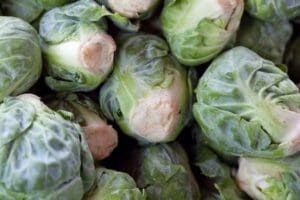Brussels Sprouts

Contents:
Season for Brussels Sprouts
Brussels Sprouts Described
How to Buy and Store Brussels Sprouts
How to Cook Brussels Sprouts
Health Benefits of Brussels Sprouts
Why Buy Natural and Organic Brussels Sprouts
Season for Brussels Sprouts August – March
Brussels Sprouts Described
Brussels Sprouts resemble tiny little cabbages, so it’s no surprise the two are closely related. These round cruciferous veggies are thought to be native to Belgium, specifically to a region near its capital, Brussels, hence the name.Typically sage green in color (occasionally you’ll find a red-hued variety), when perfectly cooked these sprouts have a crisp, dense texture and an earthy, slightly bitter taste. Unfortunately, often times they are overcooked, losing much of their allure (by emitting a sulphuric smell and turning to mush). Oftentimes you’ll find brussels sprouts sold separately but can sometimes find them still attached to the stem.
How to Buy and Store Brussels Sprouts
Select brussels for their smallish size, as they will taste more tender, 1-1 1/2 inches in diameter. Also, go for those with as vivid a color as possible and dense, firm heads – foregoing those that are puffy or wilted with any perforations or yellowing of the outer leaves. Also, try to get a bunch of brussels that are all similar in size; that way they will cook evenly. Store your unwashed sprouts in the refrigerator for up to a week; longer than that and they will develop a pungent flavor that’s been known to turn many a person off from brussels sprouts forever… which we think is such a shame!
How to Cook Brussels Sprouts
Most importantly: Do not overcook. Nobody likes a mushy brussels sprout. To help them cook more quickly and evenly cut each sprout into halves or quarters, or slice a shallow “X” in the bottom if you’re cooking them whole. After, removing any wilted leaves, trimming the ends very conservatively, slicing and soaking (to remove dirt or anything lodged under those leaves), let your brussels sprouts sit for a few minutes to release their nutrients. Cooking methods include boiling, steaming and roasting, but the boiling option results in a significant loss of their anti-cancer compounds. A quick steam is your healthiest option.
One of our favorite Autumn/Winter side dishes is thisBrussels Sprouts with Shitake Mushrooms and Crispy Shallots.
Health Benefits of Brussels Sprouts
A substantial amount of research has been done regarding the power of brussels sprouts as a prevention food – including both cancer and heart disease – because of their detox powers. Brussels contain a hefty amount of disease-fighting phytonutrients and are especially rich in vitamin A, vitamin C, dietary fiber, and folic acid, all combining to enhance the body’s resistance to any manner of health problems. For instance, brussels are thought to be very effective against colon cancer due to the presence of a compound called sinigrin.
Why Buy Natural and Organic Brussels Sprouts
While the Environmental Working Group ranks brussels sprouts among those veggies with the least amount of pesticide residues, those conventionally grown are still cultivated using chemicals – which proves hazardous for both the workers in these fields and the earth itself – regardless how many pesticides stick to the brussels sprouts themselves.
image: Clay Irving

